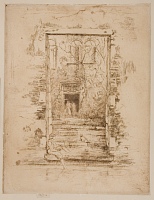Etchings Institutions search term: british museum
The Garden | ||
| Number: | 194 | |
| Date: | 1879/1880 | |
| Medium: | etching and drypoint | |
| Size: | 307 x 240 mm | |
| Signed: | butterfly at lower left | |
| Inscribed: | no | |
| Set/Publication: | 'Second Venice Set', 1886 | |
| No. of States: | 15 | |
| Known impressions: | 43 | |
| Catalogues: | K.210; M.207; W.180 | |
| Impressions taken from this plate (43) | ||
KEYWORD
TITLE
'The Garden' (1881/1886, Whistler). 1
'Garden' (1883, F.A.S.). 2
'Garden' (1886, Frederick Wedmore (1844-1921)). 3
'Garden Venice' (1890/1891, Whistler). 4
'The Garden' (1910, Edward Guthrie Kennedy (1849-1932)). 5
'The Garden' is the original and generally accepted title.
1: List, [1877-1903], GUW #13088.
2: London FAS 1883 (cat. no. 40).
3: Wedmore 1886 A (cat. no. 180).
4: List, [1890/1891], GUW #13236.
5: Kennedy 1910 (cat. no. 210).
DESCRIPTION
SITE
DISCUSSION
